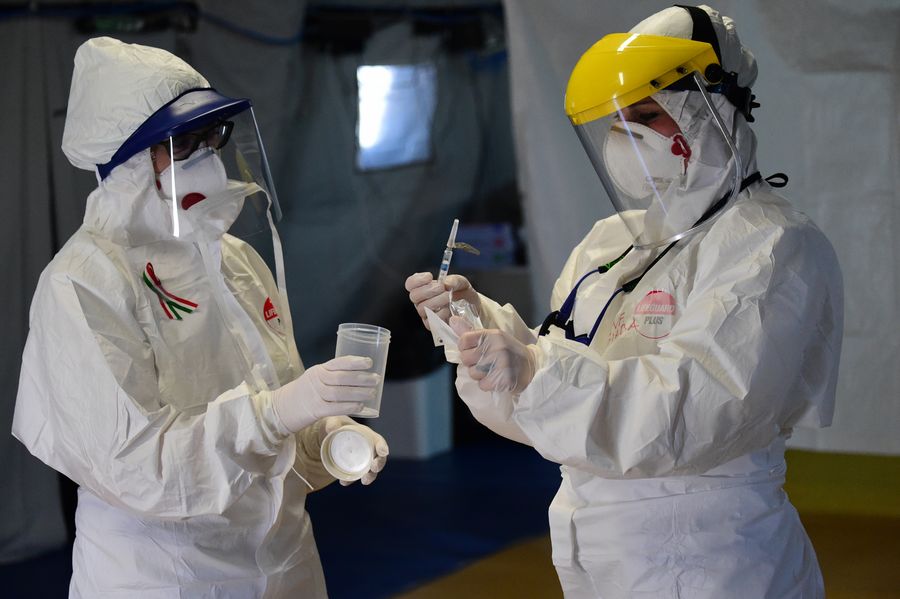
Healthcare workers check samples for further testing in Bologna, Italy, March 23, 2020. (Photo by Gianni Schicchi/Xinhua)
Although working in Lugano, a Swiss city near the border of Italy's Lombardy region which has been one of the areas hit hardest by the COVID-19 pandemic, young Chinese scholar Zhang Zhan said she is confident in Switzerland's efforts to combat the highly-infectious disease.
Zhang, a faculty member at the Universita della Svizzera Italiana (USI), one of the public-funded universities in Switzerland's Italian-speaking region, is doing research at USI's Chinese Media Observatory (CMO) and coordinating the Master Program of Media Management.
"Swiss people, being prudent in life, are too self-disciplined to violate any rules or regulations especially once they realized how severe the situation is," Zhang said.
"So long as the emergency measures are carried out," she continued, "people have no need to panic, because the Swiss government has put the health of the public as the top priority, and has assured enough supply of daily necessities for at least the next four months."
As of March 16, the federal government declared that Switzerland, home to about 8.5 million people living in a territory of less than 45,000 square kilometers, was in an "extraordinary situation" and that the entire population is urgently called upon to act responsibly. Some troops have been mobilized to help contain the spreading of coronavirus, which represents the largest army mobilization since the Second World War.
That was almost three weeks since the virus was detected in the country on Feb. 25.
"When the first case was confirmed in Ticino, the USI, where more or less half of the students are from Italy, did not shut down the campus immediately since such decision must be agreed with the canton government. However, many of the Chinese students had plenty of reasons to be anxious, because they'd learned how serious the disease could be from their home country," Zhang recalled.
"It was a hard time for them," she explained. "They were reluctant to attend classes and were not comfortable wearing face masks on campus, since the general public were told that healthy people should not wear masks here.
"The same is true for people of Chinese origin running small businesses," Zhang continued. "Without an order from the local government they couldn't close their stores or restaurants. But they were highly concerned about the high contagiousness of the epidemic."
Before launching emergency measures, the federal government mainly restricted access to hospitals for tests and treatment for those at greatest risk, especially those aged above 65. This was considering the fact that the around 1,000 ICU beds, 850 artificial respiratory machines and 45 artificial lungs could not meet the demand for all of those with the disease, according to Swiss Society of Intensive Care Medicine (SGI-SSICM). Therefore, those with minor symptoms were advised to stay at home.
However, when the number of confirmed cases soared to over 1,000 in just a few weeks, the government started to realize the severity of an epidemic which cannot be contained without emergency measures.
"In my local supermarket, bread and pasta both sold out the day the country announced the adoption of emergency measures. However, they'd been sufficiently restocked two days later when I revisited," Zhang recalled.
Aside from that, the century-long development of the pharmaceutical industry has enabled local medical corporations, such as, Hamilton Medical and Roche Holding AG, to have an edge when combating the rampant viral disease.
According to local press, Hamilton Medical, the manufacturer of intelligent medical ventilators and respiratory care supplies, can continue exporting their equipment to other European countries, such as the hardest-hit Italy. Meanwhile, the medicine and diagnostic test provider Roche has received emergency approval from the U.S. Food and Drug Administration for the coronavirus test it has developed.
Recently, Zhang has been continuing to work as usual preparing for lessons she's supposed to teach, however, not in classrooms, but through online live-streaming. Despite the exponential growth of confirmed cases which have now hit 10,000, the scholar said she plans to remain in the country, because she is confident that the disciplined citizens and the highly advanced medical technologies will eventually help turn the tide.




